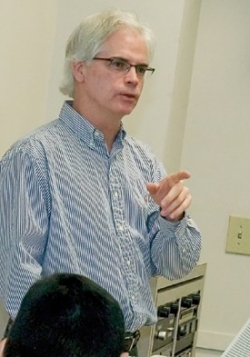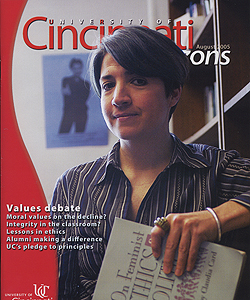TV programs program viewers to be asleep at the screen

UC professor Robin Riley. Photo/Lisa Ventre
In education, we teach people to think for themselves, which works against the philosophy of commercial television. We're trying to wake them up, and TV advertisers are trying to put them to sleep.
The bulk of TV calms you -- to be alert as a sleeping animal and asleep as a thinking animal. It's hard to enjoy something if you have to think about it. Typically, TV works on automatic primitive forces of the brain, your emotional pathways, and bypasses the cognitive, conscious elements.
Have you ever driven for a long way and lost awareness of where you were? How could you be unconscious while you were driving, yet be able to stay on the road?
When you watch TV, you zone out like that. Your thinking, analytical components are pacified. Studies show that your heart rate slows.
Typically, television does not want a conscious, thinking viewer. TV wants consumers to respond in predictable ways.
Students resist this way of thinking about television because it contradicts what they have come to expect. They tend to accept the message of television at face value and are surprised when they find that, in reality, television is more than what they had perceived it to be.
For instance, we analyzed the video of Justin Timberlake ripping that piece off Janet Jackson's blouse and revealing her breast. The way the shots were combined and the pacing of the shot selection made the students quickly realize the incident had been choreographed and staged.
They were surprised. Historically, society has always trusted TV, and we were challenging that authority figure. Some students want to remain in an embryonic viewing state and treat television like a parent.
When I present a video that challenges that common view, they often fight it. But if I show a Howard Stern video in the class, the guys who like him get embarrassed. Discussing the show intelligently in fluorescent lighting in a classroom sets a different environment.
We're questioning our news sources and the distinction between truth telling and taking on a rhetorical position. For democracy to thrive, the public needs information that allows them to make informed decisions. Ethical analysis and education provide them the tools to do that.
Robin Riley teaches media ethics and is an associate professor of electronic media at UC's College-Conservatory of Music.
Related article:
Link:
CCM's electronic media division

 Past Issues
Past Issues